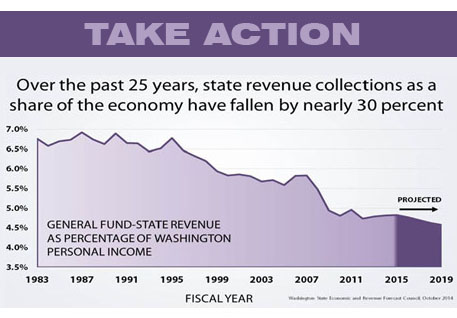STATE GOVERNMENT
Legislative Update: Sen. Hill’s collective bargaining chips
State workers’ livelihoods held hostage by ideological gambit
 OLYMPIA (May 1, 2015) — The votes are there.
OLYMPIA (May 1, 2015) — The votes are there.
A majority of state senators agrees with Gov. Jay Inslee and the House of Representatives that state employees deserve to get their first general wage increases in seven years by fully funding the negotiated collective bargaining agreements. The Senate has already voted 29-20 to do so. But as previously reported here, that was one vote short of the supermajority needed under Senate Republican leaders’ rules to make it happen.
 Since that April 3 vote, precious little progress has been made in budget negotiations between the Democratic-controlled House and the Republican-controlled Senate. On Wednesday a 30-day special extended legislative session convened to try again.
Since that April 3 vote, precious little progress has been made in budget negotiations between the Democratic-controlled House and the Republican-controlled Senate. On Wednesday a 30-day special extended legislative session convened to try again.
So, if a clear bipartisan majority agrees the state employee contracts should be funded, why is that issue still on the table?
That’s the question being asked by many state employees at “Public Service Matters” events across the state. The folks who keep our communities safe, care for the elderly and disabled, teach and protect our children, maintain our roads, and provide other essential services are feeling the love at these events from their neighbors and local business owners. The latter knows that having the state’s largest employer — the state — grant long-overdue pay raises is not just the right thing to do, it’s good for business. (Check out the schedule of more events for next week’s national Public Service Recognition Week.)
This week, dozens of community organizations, including Faith Action Network, OneAmerica, Washington State Senior Citizens Lobby and many others, co-signed a letter urging legislators to fund the contracts:
By supporting these workers, you will be making positive investments in our communities that will ripple through our businesses, faith organizations, neighborhoods, and schools… We support our public sector workers, because these employees support us. We ask that you do the same by opposing attacks on the public sector workers and fund the collective bargaining agreements.
Senate GOP members: Fund the contracts!
These people and organizations aren’t the only ones calling for contract funding, so are several members of the caucus whose leaders refuse to do so. Even as they were voting to approve the Senate budget, several Republicans advocated for a final budget agreement negotiated between the two houses that fixes this.
“We need to fully fund our collective bargaining agreements,” said Sen. Mark Miloscia (R-Federal Way). “We are short in this area and it’s hard for me to support a final budget unless we fully fund our collective bargaining agreements.”
“There is something lacking (in the Senate budget) — and it’s a big lack — and that’s the contracts that our state employee should be able to have,” Sen. Pam Roach (R-Auburn) said. “They deserve it, and I’ll be looking for that in the final budget.”
At a Workers Memorial Day event this week in Tacoma, Sen. Steve O’Ban (R-University Place) said, “I expect that the Senate and House — when we get our budgets together — the contracts will be fully approved as they were negotiated.”
And, of course, Senate Democrats strongly support funding the state employee contracts.
“We need good psychiatrists in our mental health hospitals. We need people earning a living wage in our correctional facilities. We need to make sure that people like Liz Garrels who taught me to use a cane when I was a kid so I could get around this Capitol are paid a living wage,” said Sen. Cyrus Habib (D-Seattle). “Don’t stick it to those people so we can go out and tell the media we didn’t raise taxes.”
So who exactly is trying to “stick it” to state employees?
Sen. Andy Hill seeks policy ‘concessions’
 The man who wrote the Senate budget was Sen. Andy Hill (R-Redmond). He not only failed to fund the state employee contracts, he cut health care benefits for state employees’ spouses and cut health care funding for retirees.
The man who wrote the Senate budget was Sen. Andy Hill (R-Redmond). He not only failed to fund the state employee contracts, he cut health care benefits for state employees’ spouses and cut health care funding for retirees.
But why? He must have known that several members of his own caucus didn’t support him, much less the Democratic senators with whom he negotiated. In fact, after two months of steady progress in bipartisan budget talks in that chamber, these attacks on state workers are what derailed budget negotiations.
“For over two months we worked together in a bipartisan way on this budget… but we came to a spot where we couldn’t make the two sides pull together,” said Sen. Jim Hargrove (D-Hoquiam), the lead Democratic budget negotiator. “Those areas of disagreement were largely around the collective bargaining agreements, employee benefits issues like taking away spousal coverage and the retirement benefit cut… It’s interesting to me that all of those amendments on the floor (to restore those cuts) had more than 25 votes” and therefore would have been approved if not for the supermajority rule.
So again, why did Sen. Hill target state employees in such a way if he had no hope of getting his colleagues to agree?
 The answer appeared Wednesday in The Olympian, which reported that Hill “suggested that changes in collective bargaining policy may smooth the way to Senate acceptance of the pacts.” Specifically, the article noted, Hill wants collective bargaining negotiations currently held in private to be opened to outsiders, a policy being pushed by the right-wing Freedom Foundation.
The answer appeared Wednesday in The Olympian, which reported that Hill “suggested that changes in collective bargaining policy may smooth the way to Senate acceptance of the pacts.” Specifically, the article noted, Hill wants collective bargaining negotiations currently held in private to be opened to outsiders, a policy being pushed by the right-wing Freedom Foundation.
If there is any wonder why people have become cynical about government, look no further than Sen. Hill’s ideological gambit.
The votes are there to fund the first general wage increases for public workers in seven years. The livelihoods of people who provide public services — people who’ve made considerable sacrifices in recent years — should not be used as a bargaining chip to extract policy “concessions.” If legislators want to make changes to the collective bargaining process, let those proposals pass on their own merits, not because Senate Republican leaders are holding state contracts hostage to force such changes.
Getting sent to the back of the line
Unfortunately, the special session opened Wednesday on a less-than-hopeful note.
The Senate Ways and Means Committee held a hearing on SB 6098, a new bill from Sen. John Braun (R-Centralia) that seeks to define when collectively bargained contracts with state employees are deemed “financially feasible.”
 Under the bill, state employee contracts could never be funded when projected costs to maintain existing state services exceed projected revenues. SB 6098 would literally put the state’s employees at the bottom of the list of government priorities in perpetuity, automatically rejecting bargaining agreements during an economic downturn or whenever demand for state services exceeds revenue.
Under the bill, state employee contracts could never be funded when projected costs to maintain existing state services exceed projected revenues. SB 6098 would literally put the state’s employees at the bottom of the list of government priorities in perpetuity, automatically rejecting bargaining agreements during an economic downturn or whenever demand for state services exceeds revenue.
Our state’s broken sales-tax reliant revenue system, which is the most unfair in the nation in terms of how much low-income and middle-class people pay versus the wealthiest, has already demonstrated it is incapable of maintaining necessary state services. Sen. Braun’s bill would guarantee that state employees are automatically punished first every year lawmakers continue to ignore this broken system.
Inslee signs positive bills into law
 Okay. Here’s some (desperately needed) good news out of Olympia. Gov. Jay Inslee has signed these pro-working family bills into law:
Okay. Here’s some (desperately needed) good news out of Olympia. Gov. Jay Inslee has signed these pro-working family bills into law:
HB 1595, sponsored by Rep. Tana Senn (D-Mercer Island), clarifying apprenticeship hours for truck drivers to ensure Washington has a highly skilled, readily available trucking workforce for public works construction projects. The bill passed both houses with strong bipartisan support.
HB 1496, sponsored by Rep. Mike Sells (D-Everett), makes permanent some labor-backed provisions of the vocational rehabilitation pilot program and provides financial benefits, such as partial wage reimbursement, for businesses that employ an injured worker receiving vocational services. HB 1496 was a good example of labor, business, and the Department of Labor and Industries working together for solutions that promote responsible, early return to work. It passed both houses unanimously.





